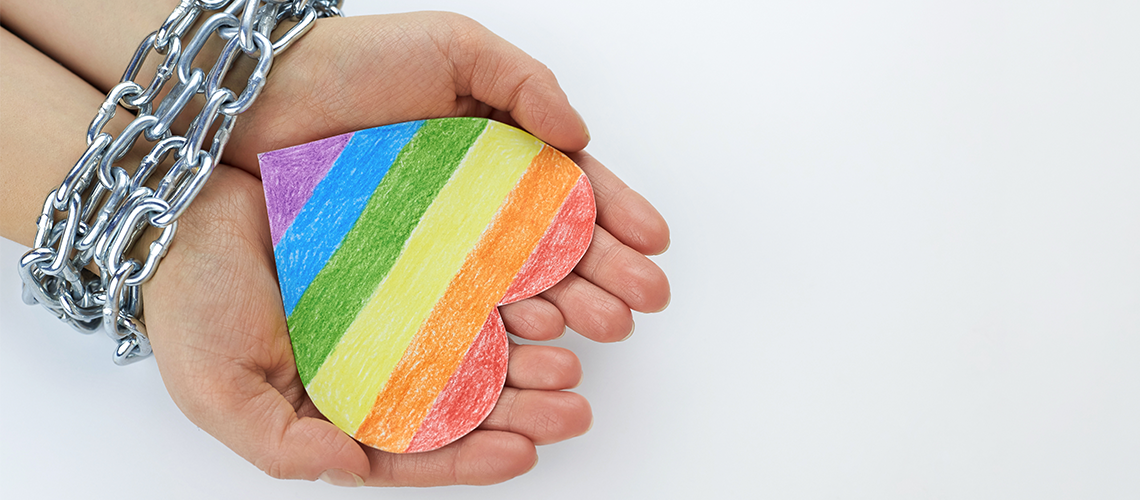LGBTQI+ rights: first convictions after Russia proclaims community to be ‘extremist’ group
Paul CrickWednesday 27 March 2024

The beginning of 2024 has seen the first convictions following the Russian Supreme Court’s designation in November of LGBTQI+ groups as ‘extremist’.
In January, a man in Volgograd was found guilty of displaying the symbols of an ‘extremist’ organisation after posting a picture of a rainbow flag on his social media page. He was fined RUB 1,000 (approximately £9). In the same month, a woman was approached in a café in Nizhny Novgorod by a man demanding that she remove the blue and yellow pin she was wearing, associating it with the colours of the Ukrainian flag. The woman and her friend were physically attacked and verbally abused with homophobic language. But while the confrontation was filmed and circulated online, police identified the woman and, rather than investigating the assault, arrested her under anti-extremism legislation because of the rainbow-coloured earrings she wore. She was sentenced to five days administrative detention.
In February, a photographer was fined RUB 1,500 for posting a photo of a rainbow flag on social media, although she had deleted her accounts in January after a call from the police.
The Supreme Court’s ruling in November had outlawed an ‘international LGBT public movement’ as extremist, following a request from the Justice Ministry to do so. This was despite no registered entity in Russia using such a term, which is simply a broad definition used by the authorities. Anne Ramberg, Co-Chair of the IBA’s Human Rights Institute Council, denounces the ruling. ‘The law ruling that forbids symbols of the LBGT movement and that defines the international LBGT movement as extremist is contrary to the task of legislation based on the rule of law’, she says.
There’s also concern about the vagueness of the ruling. Human Rights Watch describes the decision to accept ‘the international LGBT movement’ as a fictional defendant in the case as ‘perverse’, a decision compounded by it denying the participation of LGBTQI+ activists in proceedings.
Beyond legal considerations, there are profound moral implications associated with targeting individuals based on their sexual orientation or gender identity
Ryan Coyle
Co-Chair, IBA LGBTQI+ Law Committee
Russia’s anti-extremism legislation is also broad and vague. Ramberg describes the application of this and other laws as ‘arbitrary and discriminatory’ and it’s widely seen as violating a number of international human rights. Under Russian criminal law the punishment for participating in or financing an extremist organisation is punishable by up to 15 years’ detention. Someone found guilty of displaying an ‘extremist’ group’s symbols – for example, the rainbow flag, which is considered such a symbol in respect of the international LGBTQI+ movement – faces up to 15 days’ detention for a first offence, rising to four years for a repeat offence. Individuals’ bank accounts may be frozen, and they may be barred from running for public office.
Ryan Coyle, Co-Chair of the IBA LGBTQI+ Law Committee and a partner at Bilzin Sumberg in Miami, says that the conviction of LGBTQI+ people in Russia raises significant legal and moral concerns that warrant careful consideration. ‘From a legal perspective, such convictions would contravene fundamental principles of equality and non-discrimination enshrined in international human rights law’, he explains. For example, the Universal Declaration of Human Rights, as well as treaties such as the International Covenant on Civil and Political Rights (ICCPR), guarantee the right to freedom from discrimination based on sexual orientation or gender identity. ‘Convicting individuals solely on the basis of their LGBTQ status would thus violate these legal obligations and undermine Russia’s commitment to upholding human rights standards,’ says Coyle.
‘Beyond legal considerations, there are profound moral implications associated with targeting individuals based on their sexual orientation or gender identity. Convicting LGBTQ people sends a dangerous message that their identities are somehow inferior or deviant, fostering stigma and prejudice within society’, Coyle says. He adds that it also infringes upon an individual’s basic rights to freedom of expression, association and privacy.
The Supreme Court ruling in 2023 ‘opened up all gates to arbitrary and discriminatory application of the laws’, says Ramberg. There has been a visible crackdown on the community following the ruling, with raids on LGBTQI+ bars and clubs increasing in frequency. However, the Russian state’s attempts to repress the LGBTQI+ community and activists and, according to Coyle, ‘perpetuate a climate of fear and persecution’, go back much further. In 2013 it introduced a ban on ‘gay propaganda’ under the guise of the need to protect children. This sought to prevent the dissemination of information on ‘non-traditional’ sexuality, ie, anything other than heterosexuality.
In 2022 the ban was extended to specifically cover all public information or activities supporting LGBTQI+ rights. There are no exclusions for art, education or scientific studies and the wording refers to ‘propaganda of non-traditional sexual relations and/or preferences, paedophilia, and sex change’, repeating the false trope of linking the LGBTQI+ community and paedophiles. Further, in 2021, a ban on same-sex marriage, which states that marriage is between a man and a woman, was incorporated into the Russian Constitution. Russian President Vladimir Putin, who has used his invasion of Ukraine to further promote ‘traditional values’, has also made anti-gay rhetoric part of that agenda.
‘Russia should work to foster inclusivity, respect, and understanding for all its citizens, irrespective of their sexual orientation or gender identity’, says Coyle. ‘Ultimately, by rejecting the criminalisation of LGBTQ individuals, Russia can uphold its legal obligations and affirm its commitment to fostering a more inclusive and tolerant society for all.’ However, under the current regime, making Russia adhere to its legal and moral obligations seems to be an almost impossible task.
Image credit: Nadzeya
/AdobeStock.com
